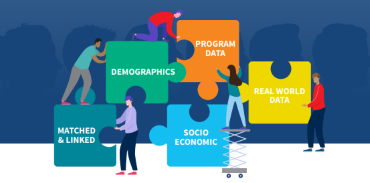
Social Determinants of Health (SDOH) fuel insights into health risks and the ability to proactively impact health outcomes
Use Social Determinants of Health to Proactively Impact Health Outcomes
Understand and mitigate health risks for veterans, military and others.
In recent years, government healthcare has been transformed by efforts to prioritize value-based care. One objective of this endeavor has been to recognize health risks before they can become health problems. By proactively mitigating those risks, patients have better health outcomes and their treatment costs are significantly less. But how can government predict the future, essentially identify risks in veterans, military and other at-risk populations, before any telling symptoms present?
Understanding Patients in a More Meaningful Way
Social Determinants of Health (SDOH) can fuel insights into health risks in a way that medical and pharmacy claims data — the primary current source of information for healthcare organizations — can’t. By taking into account the conditions in which people are born, live, work and age, SDOH can paint a more complete picture of the patient.
Research has shown those factors play a key role — as high as 50% — in an individual’s health as well as their ability to manage health conditions if and when they arise.1
Gathering Information
Where does SDOH data come from? Variables such as education, bankruptcy, criminal convictions, proximity to relatives, and other clinically-validated information, can be gleaned from public records. Then, using predictive analytics, individuals considered at risk can be identified and proactive measures taken to improve future health outcomes.
SDOH data also can help identify hospitalized patients who have a high likelihood of readmission driven by negative outcomes after release. For example, a patient who lives alone and has no relatives nearby to help, may be more likely to relapse after an illness. A patient who doesn’t have their own transportation is less likely to go to follow-up doctor appointments, which can negatively impact their outcome.
With knowledge of those types of patient challenges and more, healthcare providers can take action to mitigate risk such as recommending care intervention like a visiting nurse, or arranging transportation to doctor appointments.
LexisNexis® Socioeconomic Health Scores
It’s no secret that most healthcare providers are overworked and short on time. So how can they be expected to gather, review and interpret SDOH data?
LexisNexis® Risk Solutions simplifies the collecting and analysis of SDOH data for healthcare providers. It provides a health score on a patient based on the data, which can then be used for risk stratification. If providers can quickly identify patients at risk, they can offer proactive solutions.
LexisNexis Socioeconomic Health Scores — validated against actual claims data — have been found to be better indicators of future health outcomes than traditional age-gender demographic risk predictions. And when socioeconomic data is combined with patient electronic health records, providers have a more holistic view of their patients, allowing them to make better-informed decisions.
Have Sales Contact Me
Benefits
With health scores based on SDOH, healthcare providers can:
- Focus on prevention by identifying risk factors
- Improve health outcomes
- Increase engagement of patients
- Reduce hospital readmissions
- Decrease treatment costs
- Meet healthcare quality standards
Features
LexisNexis Risk Solutions leverages hundreds of our unique, statistically-validated Socioeconomic Health Attributes combined with our vast data resources and advanced linking technology to develop risk prediction scores.
Providers can readily access those scores without having to build their own models. They can use them to be proactive with patients, enhance quality of care and improve outcomes for the at-risk populations they serve.
1County Health Rankings, www.countyhealthrankings.org
Other products and services may be trademarks or registered trademarks of their respective companies.



